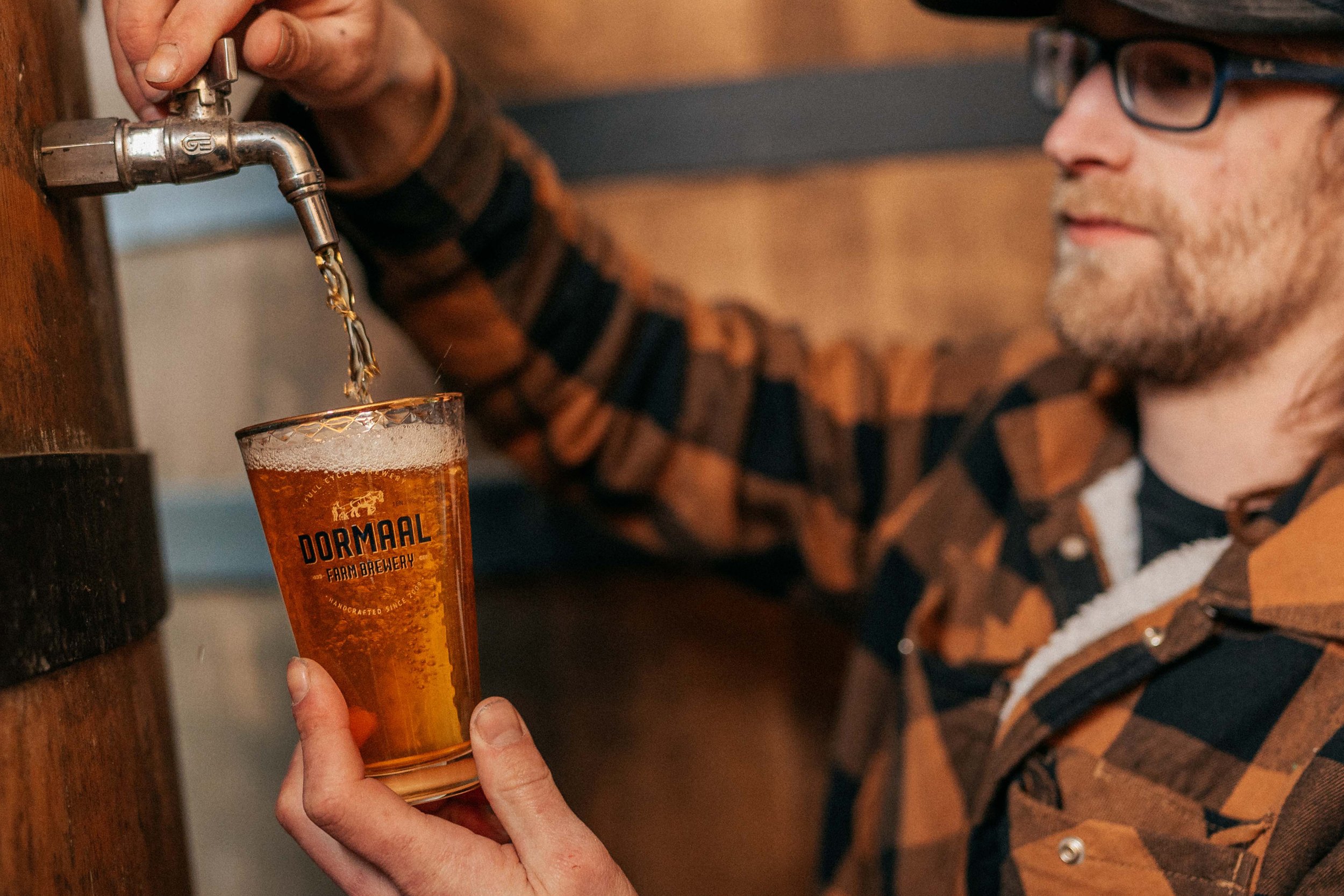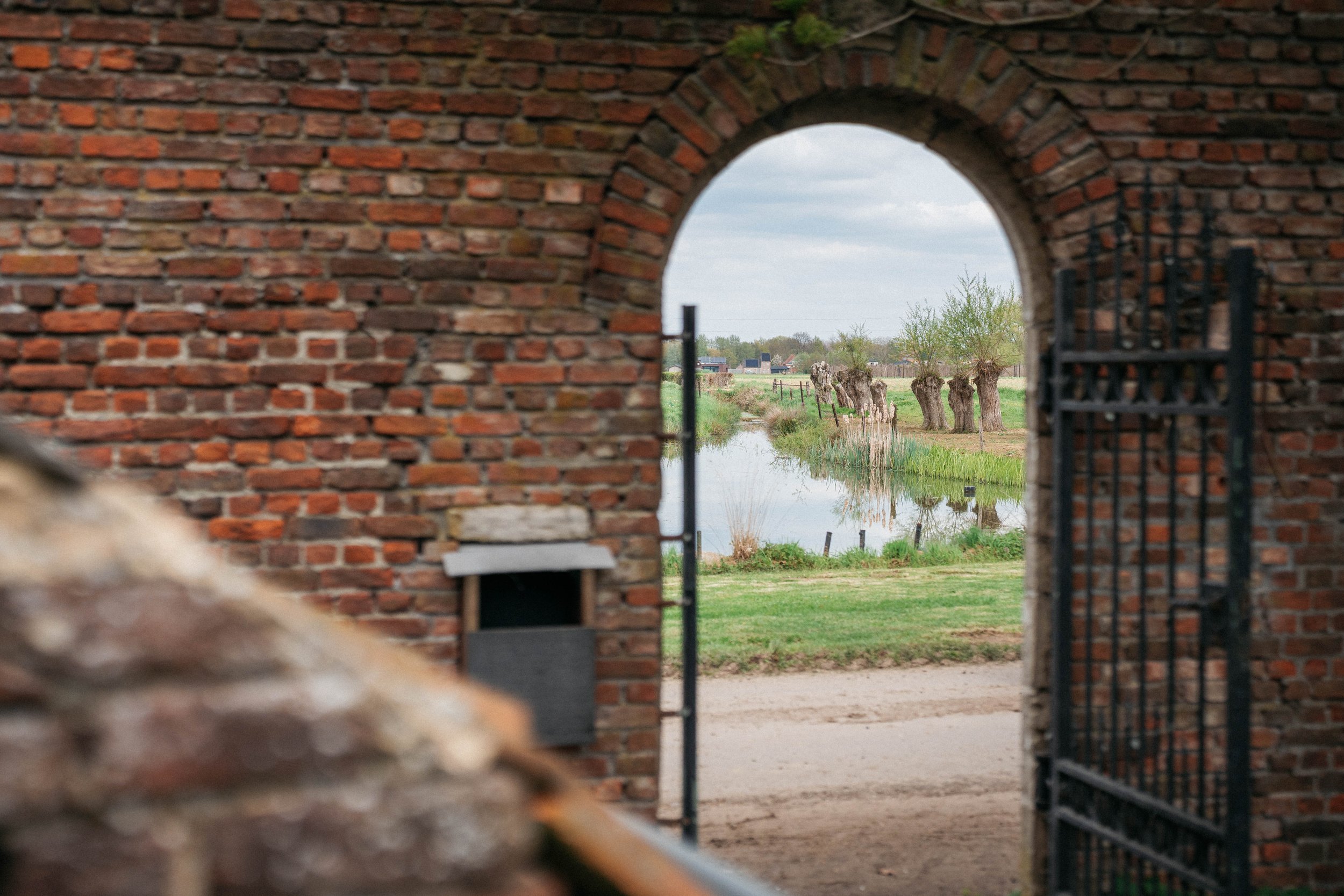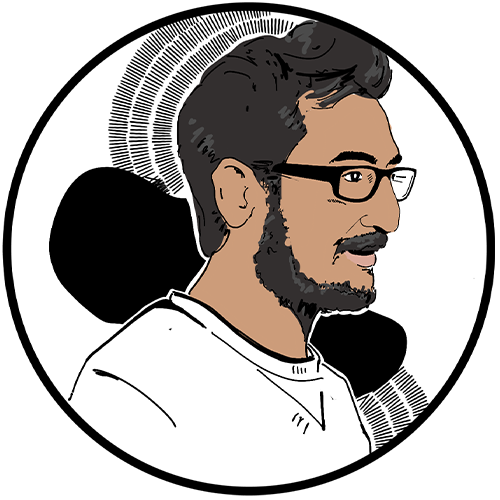“We are not beer geeks,” says André Janssens, the owner of Brouwerij Hof ten Dormaal. “99% [of people] who start a brewery are beer lovers. I was an accountant. He was the farmer,” he says, as he points to his elder son, Dries, while his younger son, Jef, looks on. “Then I had a disease: A brain stroke. I started brewing with these two to find a way out of all the misery in my head.”
Since its founding in 2009, Hof ten Dormaal—located on a 12th-century farm in the village of Tildonk, deep in rural Flanders—has charted its own stubborn course and defied expectations. It’s not just that unusual founding story that defines it. The brewery’s perspective is informed by its owners’ strong opinions about what it means to make and sell “farmhouse” beer, and the beer they produce reflects their characters as well as their struggles.
Today, it’s nominally spring at the brewery, but winter refuses to budge, its mist like a bedsheet stubbornly pulled down over the brown, sparse fields. The view from the Janssens’ kitchen table mirrors their downbeat mood—their restlessness, as they wait to return to their work, is palpable. But the conversation is still tinged with optimism, despite everything that the family has had to endure.
I’m here because I want to see for myself how the brewery has managed not only to survive but to thrive, despite weathering a series of disasters—from the COVID-19 pandemic to a fire that almost wiped out its operations. And it has done so while also pursuing a time-consuming and difficult approach to production: The Janssens only use ingredients sourced from their farm, from grains and hops to fruit and yeasts. It is a volatile practice that leads to conflict, improvisation, and frustration in equal measure.
But it also leads to distinction, in both senses of the word. Take Hof ten Dormaal’s apple Champagne beer, Golden Delicious. Made from the titular apples, it at first presents like a sparkling fine wine with lychee, pear, and honey on the nose before giving way to a distinctly Belgian, estery fruitiness. When I enthuse to André, he replies matter-of-factly: “It’s still beer.” But its contrasting flavors are transportive, taking me from the lush green fields of the Champagne region to the muddy fields of rural Belgium and back again.
Sharing this beer feels like it bonds me to the family after a slow start. I’d visited the year before on a tour of rural Belgian breweries, but when I reappear at the farm’s wooden gate, Dries confesses he doesn’t recognize me, and that I must not have made much of an impression the first time. I hadn’t forgotten them, though, and even longed to see them again, charmed by their argumentative but thoughtful conversation. As Dries shows me to their kitchen table, I look forward to watching them hold court once more.
After André Janssens’ stroke in 2009, his wife, Mol, ordered him to take a holiday. The family had moved from a nearby village, Kampenhout, to the farm in 1998. They’d bought it because they liked the prospect of a quiet lifestyle; Dries wanted to be a farmer, and living and working in the countryside appealed. It’s easy to see why: The farm’s entrance look onto a tranquil pond, and behind the stone-floored farmhouse are acres of flat, fertile fields.
But for André, the quest for serenity meant a change of scenery was necessary. During his two-week break, he found himself in the mountains near Butte, Montana, where he bought a 13-barrel brew kit, despite having no prior experience in brewing.
André had never really drunk beer. Making it struck him as a monastic lifestyle choice, one free from stress. After recognizing that misapprehension, the family enlisted an engineer and brewery consultant, Peter Kins, who taught them the fundamentals. Despite his farming ambitions, Dries oversaw production for the first five years—his brother Jef, now the head brewer, was only 18 at the time—and they focused on traditional Belgian beer styles.
But beneath the familiar appearance were ambitions to pioneer a new model of ecological brewing. As they invested more in their farmhouse brewery vision, their beers evolved. Barrel-aged, small-batch beers made with foraged ingredients started to populate their portfolio (alongside the classic Blondes, Ambers, and large-batch Krieks), and they developed their own house culture over a two-year period. Virtually everything was—and is—grown, brewed, and bottled on-site.
Today, 20% of the beers Hof ten Dormaal produces are sold in its taproom to a largely local audience. Roughly 35%–40% are distributed locally, with the remainder going to the wider Belgian market (30%–35%), Italy (10%) and the rest of Europe (55%–60%). The brewery’s ever-changing portfolio includes a Wit Goud (translated: white gold), which uses dried chicory—a bitter-tasting plant long associated with the region—as a replacement for a portion of the hops, as well as raw wheat. In addition to its Saisons (including one brewed with green tea), the brewery still produces styles like IPAs, Wheat Beers, and Amber Ales—its most popular release is Tripel Blond (8% ABV), made with Magnum and Hersbrucker hops.
“I like brewing,” Jef says when I ask about what motivates him to create these boundary-pushing styles. “I like creating something. I like doing it on my own.”
Although Dries had been working as a pharmacist before getting involved in the brewery, he knew he had to give it up. Being a farmer—and not having a boss—was the only thing he could really see himself doing. He compares himself to a Belgian fisherman he once saw on TV, whose wife said that even when they’re on vacation he’s drawn to the sea. “If I go somewhere I look at the field,” he tells me. “If there is cycling on TV I look at the fields. I don’t long for holidays and I never go on holidays.”
It’s not any specific crop that excites him, he says. “It’s about the lifestyle. It’s about making your own living and tending to your fields. It’s not like you have a job and if you don’t like it, you quit and do another job. Farming is a lifestyle and it’s the life I like. I don’t want to do anything else. I’m happy, for sure.”
As Dries tells it, beer came along at Hof ten Dormaal in part because it was a way to make a profit out of farming, and to do so while producing what the family wanted to grow.
“It’s super uncertain, and your strings are pulled from above,” he says of the economics of farming in the European Union. “Europe subsidizes the farmers, but it’s a vicious circle because they pay you money to produce cheap grains—but then you have to listen to them because they pay you money. We try to break from this by making something that’s worth more than the grain—the beer and malt—so at least pricing is in our own hands. You make value out of the products by making beer out of it.”
In the middle of our conversation, their sister Lisa’s children arrive for lunch. As we slice weisswurst sausage and Flemish cheese, it’s clear how family-oriented the Janssensare, and how this farm is as much about sustaining their life, based around this kitchen table, as it is about the beer.
“It’s about the lifestyle. It’s about making your own living and tending to your fields. It’s not like you have a job and if you don’t like it, you quit and do another job. Farming is a lifestyle and it’s the life I like. I don’t want to do anything else.”
When the kids finish eating, Jef and I begin to talk about how he found his own way into the family business. “When I was young I was full of energy, arrogance, and enthusiasm,” he says in a tone not dissimilar to his father’s. “I was like all kids—I wanted to be a professional footballer or rockstar but, really, I had very little ambitions when I was younger.”
Brewing wasn’t something he had envisioned for himself. At first, he did it because it was expected of him. Passion came later, and with it strong opinions about how the industry conducts itself. “Now the innovation in brewing styles has been reduced to dry hopping,” he says, as he reflects on what he sees as the problems of today’s breweries. “Everything that’s hopped it’s either overly dry-hopped Pale Ales or add[ing] lactose into beer and turn[ing] it into [something that is] not beer.”
For Hof ten Dormaal, by contrast, innovation starts from managing the raw materials. The first crop the family farm grew was summer barley. Today, what Dries plants and harvests is dictated by the brewery’s needs, even though only a third of its crops are used for beer. When I ask Dries if he ever argues with Jef over which crops to grow, he replies: “Of course! If Jef wants to make a rye beer I now grow rye, even though I didn’t before. But the farming cycle takes a year.” Sometimes, he explains, the brewery needs only one hectare of wheat—but he has to grow six hectares because of the demands of the crop cycle.
“It seems complicated,” he adds. “But it’s pretty easy. I try to make sure all the ingredients are there for the brewhouse.”
If the family has clearly defined roles for its sons—Jef as the brewer who refuses to give in to fads, Dries as the farmer who grows exactly what’s needed for the beer—then André strikes me as Hof ten Dormaal’s resident philosopher.
“I love the way they grow their own hops and grains. It’s an amazing operation—it’s a farm-to-table beer.”
Though he’s officially retired, he is still present: During my first visit to Hof ten Dormaal, it was André who explained the story behind the beers. On that winter night, he reminded me of a real-life Pierre van Klomp, the fictional Belgian brewer created by beer bloggers Boak and Bailey who grumpily spouts wisdom. He seemed most at ease when spinning the brewery’s story into something relatable, making you believe that you were holding a glass of something special but still achievable, as long as you put in the effort.
Now, as he pours me tea, he muses about one of the most difficult chapters in the brewery’s story: Its arrival in the U.S. market, and the hype that grew around it, before its eventual retreat.
“We didn’t know how the market worked at the beginning,” André says. “We sent all the beers to the U.S. through one client. It was very easy but it also was very dangerous [...] But it was so easy until our client in the U.S. went broke.”
The client André refers to is 12% Imports. It had begun by distributing obscure Belgian beers it tracked down from breweries like Hof ten Dormaal, but its focus evolved into partnering with nomadic U.S.-based breweries. That change meant that Hof ten Dormaal’s access to the U.S. market was cut off, and the danger André was warned of became very real.
For bars like Monk’s Cafe in Philadelphia—which specializes in Belgian beer, and which had fostered a great rapport with the Janssens—the loss was palpable. “I love the way they grow their own hops and grains,” says Tom Peters, Monk’s founder. “It’s an amazing operation—it’s a farm-to-table beer.”
But it wasn’t just its mixed fortunes overseas that threatened Hof ten Dormaal’s success. Early one morning in January 2015, the brewery caught fire.
“It caused a lot of damage,” Jef says. “By the time the fire brigade came there was nothing left. It happened at night and we didn’t notice it ’til 6 a.m. I woke up and heard the roof tiles falling. It took four years to rebuild.”
I can sense his reticence when talking about the event as we walk over to look at the rebuilt farmhouse. The loss was catastrophic: Hof ten Dormaal’s bottling line, conditioning rooms, and most of its stock were destroyed. Only the brew kit remained relatively intact.
“We were never able to …” André begins to say, but Jef finishes his sentence. “We were never able to recover. The days before the fire were always better than the days after.”
After the fire, Jef spoke in interviews about how the beer quality suffered because of the destruction, and how difficult it was to work for two years in a brewery that didn’t have a roof. But Hof ten Dormaal was lucky to have champions in the beer industry, including Tom Peters of Monk’s Cafe. In the aftermath of the fire, the brewery still managed to bottle a beer for a Philly Beer Week collab.
“It was two weeks after the fire,” Peters says. “Everything was smoke-filled. They had to be very careful to not make it a smoked beer.” The release showed both their skill as brewers and how honorable the Janssens are to their friends.
It’s only in the past couple of years that the beer quality is back to its former standard, according to the family. But sales have been slow to stabilize, given a new onslaught of challenges. “COVID was bad for us,” Jef says. “[And] we lost all our [U.S.] customers. So we started selling our beer here.”
After lunch, Jef and I are sitting by the small pond, encircled by reeds, that’s near the entrance to the farm. He tells me the pond freezes most winters, and that his nephews can ice skate on it. In summer, it’s common for people who live in nearby Leuven, a vibrant university town, to cycle here. Jef says he loves serving customers at the brewery, and that he would prefer to “sell it all here. That’s the ideal world.”
“There’s no additions. It’s a 100% natural beer—the spelt and the rye give just enough flavor. This is more ‘craft’ than any lactose beer where they make a different one every day with coconut flavorings, which they also sell as if it’s God’s own creation.”
The morning grayness has now lifted slightly, a bright sunlight starting to win a meteorological battle against the low-lying clouds. The mood between us has changed, too. Jef’s wife recently gave birth to their first child, a boy. While sharing a beer, we exchange stories of parenthood and how to navigate childcare costs (easier in Belgium) and sleep deprivation (hard in every country).
As we talk, we share two 5.8% Saisons, which are citrusy and grassy, with lemongrass on the nose and a lingering tartness and funk. It’s complex and subtle, and its candied-fruit taste isn’t overpowering—the opposite of some bubble-gummy Saisons I’ve had.
Jef has fashioned this beer from barley, wheat, spelt, a bit of rye, and hops, all grown on the farm. “There’s no additions,” he tells me. “It’s a 100% natural beer—the spelt and the rye give just enough flavor. This is more ‘craft’ than any lactose beer where they make a different one every day with coconut flavorings, which they also sell as if it’s God’s own creation.”
Today, Hof ten Dormaal feels contradictory. Its beers are better than ever, yet it still feels like it’s finding its footing after a period of change, struggle, and contraction. But as one of the few true farmhouse breweries in Belgium, what Hof ten Dormaal continues to insist on is producing beers that are innovative as well as paying tribute to the country’s great brewing traditions.
“Making beer is far easier than selling beer,” André says. “You can find far better hamburgers than McDonald’s but it’s still the best-selling hamburger. That’s marketing. That’s publicity. That’s money. We are not marketeers.”
They may not be marketeers, but their story—fed by raw honesty, familial debate, and providence—still suffuses everything they do.



























